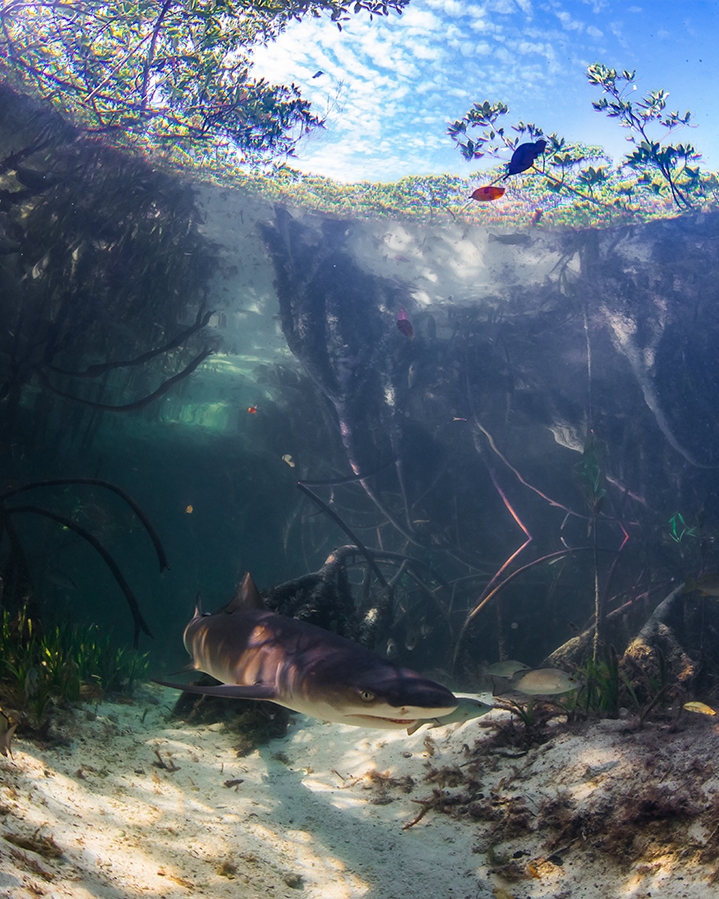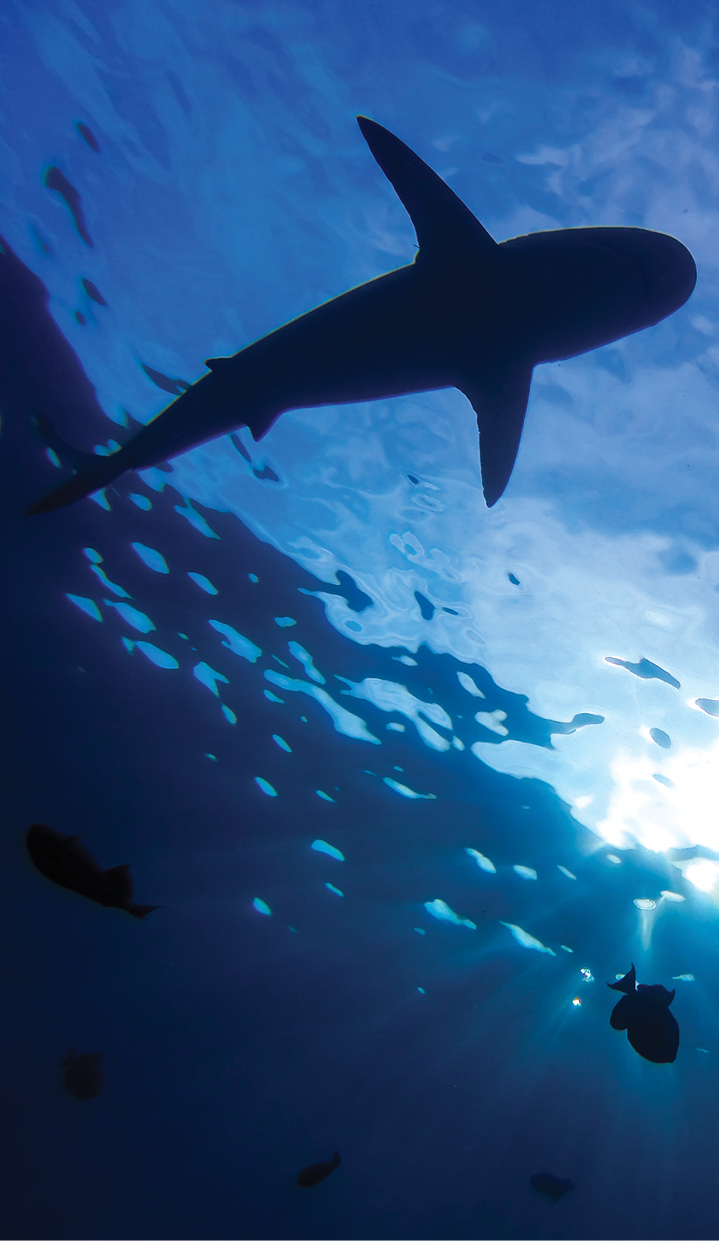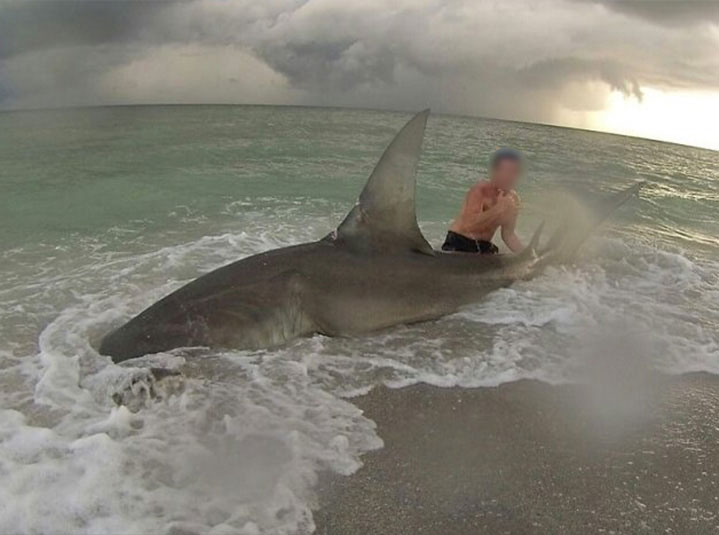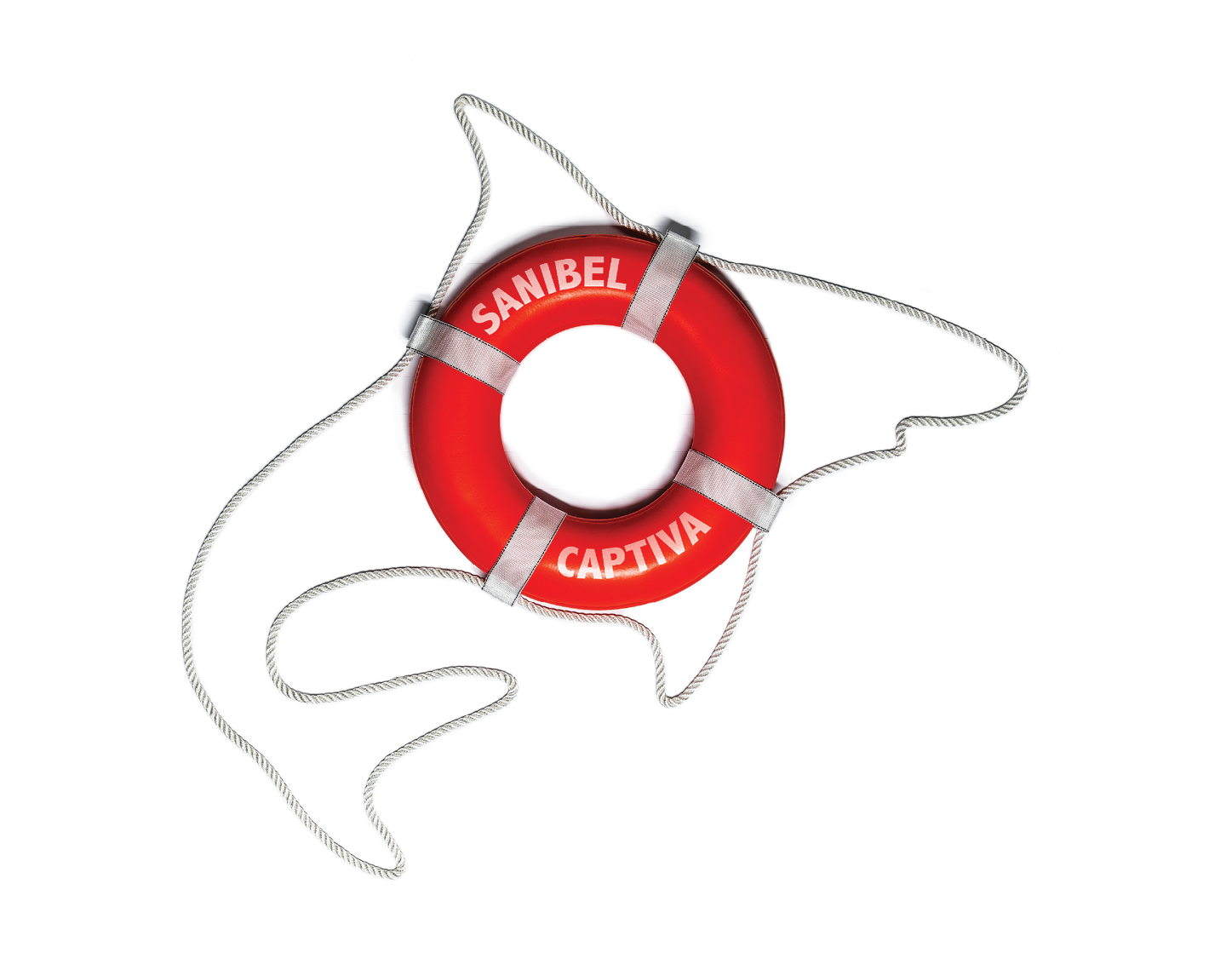
The productive coastal waters around Sanibel and Captiva are an important place for many species of sharks to feed, to mate, and to give birth to their young. Most sharks are apex predators that help keep our coastal ecosystem in balance. A decline in their populations can cause cascading effects down through the food web and can greatly impact the stability of our other local fish populations. You can protect our vulnerable shark populations by practicing safe shore fishing techniques.

CATCH AND RELEASE OF PROHIBITED SHARK SPECIES

Keep shark gills submerged. Protect the shark’s vital organs by keeping it in the water with its gills submerged while you safely unhook it.
Release sharks quickly. Always bring required tools for quickly removing the hook. If you can’t remove the hook easily, cut the line (the hook will eventually rust out). Never delay a shark’s release to take photos.
Minimize fighting time. Fighting a shark to exhaustion drastically increases the likelihood that it will die shortly after being released.
Don’t mishandle sharks. Never pull a shark by the tail, pick a shark up by the gill slits, throw a shark, or sit on top of a shark to pin it down.
Push gently to release. Push the shark firmly, but gently from behind its first dorsal fin, facing it into the flow of the current to maximize water flow over the gills.
Watch it swim away. Maintain a visual of the shark for as long as possible to ensure that it continues to swim away. If the shark dies, you must report the death by calling the FWC fish kill hotline: 800-636-0511.
If you don’t know, let it go! Treat unknown shark species as prohibited species.
Release sharks quickly. Always bring required tools for quickly removing the hook. If you can’t remove the hook easily, cut the line (the hook will eventually rust out). Never delay a shark’s release to take photos.
Minimize fighting time. Fighting a shark to exhaustion drastically increases the likelihood that it will die shortly after being released.
Don’t mishandle sharks. Never pull a shark by the tail, pick a shark up by the gill slits, throw a shark, or sit on top of a shark to pin it down.
Push gently to release. Push the shark firmly, but gently from behind its first dorsal fin, facing it into the flow of the current to maximize water flow over the gills.
Watch it swim away. Maintain a visual of the shark for as long as possible to ensure that it continues to swim away. If the shark dies, you must report the death by calling the FWC fish kill hotline: 800-636-0511.
If you don’t know, let it go! Treat unknown shark species as prohibited species.

Keep shark gills submerged. Protect the shark’s vital organs by keeping it in the water with its gills submerged while you safely unhook it.
Release sharks quickly. Always bring required tools for quickly removing the hook. If you can’t remove the hook easily, cut the line (the hook will eventually rust out). Never delay a shark’s release to take photos.
Minimize fighting time. Fighting a shark to exhaustion drastically increases the likelihood that it will die shortly after being released.
Don’t mishandle sharks. Never pull a shark by the tail, pick a shark up by the gill slits, throw a shark, or sit on top of a shark to pin it down.
Push gently to release. Push the shark firmly, but gently from behind its first dorsal fin, facing it into the flow of the current to maximize water flow over the gills.
Watch it swim away. Maintain a visual of the shark for as long as possible to ensure that it continues to swim away. If the shark dies, you must report the death by calling the FWC fish kill hotline: 800-636-0511.
If you don’t know, let it go! Treat unknown shark species as prohibited species.
Release sharks quickly. Always bring required tools for quickly removing the hook. If you can’t remove the hook easily, cut the line (the hook will eventually rust out). Never delay a shark’s release to take photos.
Minimize fighting time. Fighting a shark to exhaustion drastically increases the likelihood that it will die shortly after being released.
Don’t mishandle sharks. Never pull a shark by the tail, pick a shark up by the gill slits, throw a shark, or sit on top of a shark to pin it down.
Push gently to release. Push the shark firmly, but gently from behind its first dorsal fin, facing it into the flow of the current to maximize water flow over the gills.
Watch it swim away. Maintain a visual of the shark for as long as possible to ensure that it continues to swim away. If the shark dies, you must report the death by calling the FWC fish kill hotline: 800-636-0511.
If you don’t know, let it go! Treat unknown shark species as prohibited species.


SHORE-BASED SHARK FISHING REQUIREMENTS

Permits and knowledge:
Gear requirements:
Location and timing:
If the shark is tagged:
Recapture information is very valuable for understanding and protecting shark populations.
- You must have taken the FWC shore-based shark fishing course and be able to show certification of that course.
- You must possess a valid Shark Fishing Permit.
- Know your local shark species and how to identify them
Gear requirements:
- Use hook and line method only.
- The State of Florida prohibits stainless steel hooks, and any hook with two or more points and a common shaft is illegal. The barb of the hook must be filed off.
- Use non-offset, carbon circle hooks. Sharks are more likely to swallow and become gut-hooked by J-hooks.
- You must possess a compliant tool capable of quickly cutting the leader or hook if necessary, such as pliers.
- Use heavy tackle; a minimum of 80-pound test, with a leader. Using too light of tackle to lengthen fight time should be discouraged.
- Do not use a gaff.
- Chumming of any kind is prohibited when fishing from shore or when wade fishing in waters adjacent to shore.
Location and timing:
- Avoid shark fishing on crowded beaches or during high-traffic times of the day.
- Avoid shark fishing near swimmers or popular swimming areas.
- Do not target sharks if the surf is too rough for you to safely catch and release them.
- Refrain from swimming or kayaking bait out a long way from shore, as it significantly increases the fight time and can decrease the shark’s chance of survival.
- During sea turtle nesting season (April 15 through October 31), use only amber or red lighting when fishing from the shore.
If the shark is tagged:
Recapture information is very valuable for understanding and protecting shark populations.
- If it is safe to do so, record the information on the tag and leave it intact and attached to the shark.
- If it is not safe to read the information on the tag, remove it by cutting the monofilament tether at the base of the tag. Do NOT attempt to pull the tag out.
- Report the shark to the agency listed on the tag.
- This process cannot delay the release of a prohibited shark species
Permits and knowledge:
Gear requirements:
Location and timing:
If the shark is tagged:
Recapture information is very valuable for understanding and protecting shark populations.
- You must have taken the FWC shore-based shark fishing course and be able to show certification of that course.
- You must possess a valid Shark Fishing Permit.
- Know your local shark species and how to identify them
Gear requirements:
- Use hook and line method only.
- The State of Florida prohibits stainless steel hooks, and any hook with two or more points and a common shaft is illegal. The barb of the hook must be filed off.
- Use non-offset, carbon circle hooks. Sharks are more likely to swallow and become gut-hooked by J-hooks.
- You must possess a compliant tool capable of quickly cutting the leader or hook if necessary, such as pliers.
- Use heavy tackle; a minimum of 80-pound test, with a leader. Using too light of tackle to lengthen fight time should be discouraged.
- Do not use a gaff.
- Chumming of any kind is prohibited when fishing from shore or when wade fishing in waters adjacent to shore.
Location and timing:
- Avoid shark fishing on crowded beaches or during high-traffic times of the day.
- Avoid shark fishing near swimmers or popular swimming areas.
- Do not target sharks if the surf is too rough for you to safely catch and release them.
- Refrain from swimming or kayaking bait out a long way from shore, as it significantly increases the fight time and can decrease the shark’s chance of survival.
- During sea turtle nesting season (April 15 through October 31), use only amber or red lighting when fishing from the shore.
If the shark is tagged:
Recapture information is very valuable for understanding and protecting shark populations.
- If it is safe to do so, record the information on the tag and leave it intact and attached to the shark.
- If it is not safe to read the information on the tag, remove it by cutting the monofilament tether at the base of the tag. Do NOT attempt to pull the tag out.
- Report the shark to the agency listed on the tag.
- This process cannot delay the release of a prohibited shark species

REPORT MISHANDLING OF SHARKS

If you see a shark in trouble or being mishandled, please take action:
- Call the Sanibel Police nonemergency number and report your concern: 239-472-3111.
- Call the FWC and report your concern: 888-404-3922.
- Report the violation to the FWC online.
- Take photos of the situation if you can safely do so.
If you see a shark in trouble or being mishandled, please take action:
- Call the Sanibel Police nonemergency number and report your concern: 239-472-3111.
- Call the FWC and report your concern: 888-404-3922.
- Report the violation to the FWC online.
- Take photos of the situation if you can safely do so.




